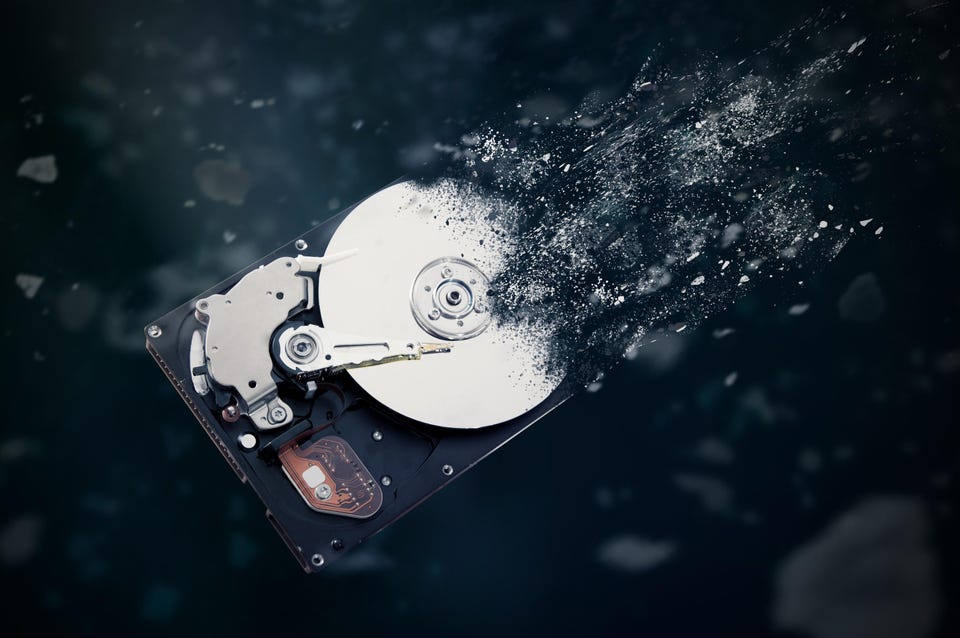Consumer Tech Hard Disks Don’t Die Young Anymore Barry Collins Contributor Opinions expressed by Forbes Contributors are their own. I am a consumer tech expert writing about Windows, PCs, laptops, Mac, broadband and more. New! Follow this author to improve your content experience.
Got it! Aug 2, 2022, 09:00am EDT | New! Click on the conversation bubble to join the conversation Got it! Share to Facebook Share to Twitter Share to Linkedin Hard disks are more reliable than their reputation suggests getty “Infant mortality” in hard disks has become a thing of the past, according to online backup firm Backblaze. Backblaze has more than 200,000 hard disks being used to store customers’ data and regularly reports on the reliability of individual models. The latest report shows that traditional spinning hard disks are nowhere near as fragile as their reputation suggests.
Only three of the 27 models of hard disk reported on by Backblaze had an annualized failure rate of over 2. 5%. But all three of those models had a low sample size, meaning Backblaze couldn’t be more than 95% confident of the failure rate.
The overall annualized failure rate of all the disks in Backblaze’s study was only 1. 46%. Although that’s up slightly from previous years, the company says this is due to the increased age of its fleet, not diminishing reliability.
In short: hard disks very rarely fail, especially in the early years. Eradicating bad drives How do the disk manufacturers achieve such low failure rates, with many of the disks in Blackblaze’s fleet now being in active service for five or six years? Backblaze’s Principal Storage Cloud Evangelist, Andy Klein, puts it down to improvements in manufacturing. “It used to be the drives, just like everything else mechanical and electromechanical followed a bathtub curve,” he said.
The bathtub curve sees relatively high “infant mortality” in the early life of a disk, before settling down, only for failure rates to climb again as the disks age. Recommended For You 1 Google Issues Warning For 2 Billion Chrome Users More stories like this Fewer stories like this 2 Forget The MacBook Pro, Apple Has Bigger Plans More stories like this Fewer stories like this 3 Google Discounts Pixel 6, Nest & Pixel Buds In Limited-Time Sale Event More stories like this Fewer stories like this “What we’ve seen over the last several years now is the front end of that curve is almost flattened out,” said Klein. “And you see the backside start to push a little bit.
So where the failures started to rise after two and a half, three years, now the rate doesn’t start to rise until you get to about four years. ” Klein believes the early failure rates have been largely eradicated due to better testing of new models by the hard disk manufacturers, who are putting new drives through more intensive tests before putting them on sale. “Getting a DOA [dead on arrival] drive happens a lot less,” said Klein.
“I can’t recall our guys talking about that at all in the last year or two. ” Using AI to predict failures With drive failures becoming increasingly rare, Backblaze has been experimenting with AI models to predict when drives in its fleet may die. Although such AI models have had some success, the problem is they don’t easily translate from one model of hard disk to the next.
“Every new model creates a different set of characteristics that you have to go and track down,” said Klein. However, one model created by a third party did identify the characteristics that will show when a drive is likely to carry on working normally for the foreseeable future. “To have that kind of knowledge is kind of interesting,” said Klein.
He said that if the company can deploy a drive and know that “under this set of circumstances, it’s got a 99% chance it’s going to survive a year, that’s a good thing, I’m feeling really good about that. ” That might allow the company to delay maintenance on a particular server, or not replace a disk that would normally be expected to be reaching the end of its lifecycle. Follow me on Twitter or LinkedIn .
Check out my website . Barry Collins Editorial Standards Print Reprints & Permissions.
From: forbes
URL: https://www.forbes.com/sites/barrycollins/2022/08/02/hard-disks-dont-die-young-anymore/
